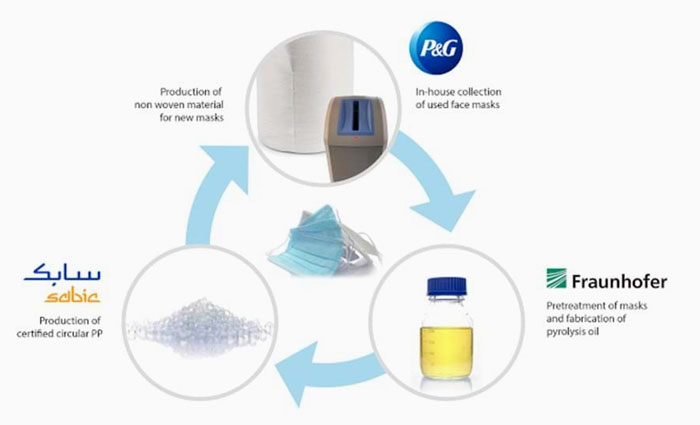|
Innovative Process For Recycling Of Single-Use Face Masks
The COVID-19 pandemic forced the use of
disposable face masks. Discarding them has become an
environmental challenge on a global scale. Even
post-pandemic, the healthcare industry will continue to
generate tons of waste from single-use disposables.

This prompted the Fraunhofer Cluster of
Excellence Circular Plastics Economy CCPE and the
Fraunhofer Institute for Environmental, Safety and Energy
Technology UMSICHT to develop an innovative recycling
process for used plastics by implementing a pilot project
with an objective to offer a sustainable option for the
medical sector.
Dr. Hofmann, Fraunhofer teamed up with
SABIC and project initiator Procter & Gamble (P&G) to
demonstrate the feasibility of closed-loop recycling of
single-use face masks.
Procter & Gamble collected used face
masks worn by its employees and sent them over to the
Institute. Pyrolysis was used to convert the masks to oil
which thermochemically converted the masks at around 650
degrees Celsius in the absence of oxygen. This process
produces -among other things - pyrolysis oil.
The benefit of this process is that the
high temperatures will also destroy any biogenic material
such as pathogens, residual pollutants, etc.
Subsequently, the recovered pyrolysis
oil was sent to SABIC. The company used it as feedstock
for its processes and produced polypropylene, another
plastic that is needed to make masks.
The reason behind using this process is
to neutralize hazardous medical waste. Masks not only
feature polypropylene as a material but also contain nose
wires or similar objects. Mechanical recycling would not
have worked in this case.
The mass and energy balance of the
approach is another advantage. The process allows to track
how much oil is recovered from the masks. It amounted to
nearly 50 percent, which means 50 percent of the old masks
could be converted back into new masks.
Surgical masks were used in the
project, however, FFP2 (KN95) masks can also be used. It
can even apply to plastics - especially general plastic
packaging.
The Institute plans to achieve a
technology scale-up. It has a system that can convert at a
rate of 70 kilograms per hour. Their goal is to develop
these types of units on a larger scale.
They have already received inquiries
and are in talks with several stakeholders in the
healthcare system. Thatís because material contained in
personal protective equipment is presently incinerated for
safety reasons, contributing to both soaring CO2 emissions
and increasing demand for raw material. This process not
only avoids incineration but also creates a petroleum
substitute thereby addressing existing industrial
processes and generating a substitute for petroleum,
meaning fossil fuels.
(Based on an Interview by
MEDICA-tradefair.com with Dr Alexander Hofmann, Head of
Department Recycling Management at Fraunhofer Institute
for Environmental, Safety and Energy Technology UMSICHT ).
|
